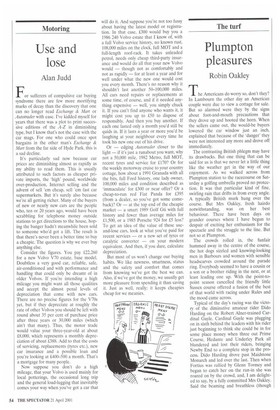Use and lose
Alan Judd
For sufferers of compulsive car buying syndrome there are few more mortifying marks of decay than the discovery that one can no longer read Exchange & Mart or Autotrader with ease. I've kidded myself for years that there was a plot to print successive editions of the A-Z in diminishing type, but I know that's not the case with the car mags. For one who could once spot bargains in the other man's Exchange & Mart from the far side of Hyde Park, this is a sad decline.
It's particularly sad now because car prices are diminishing almost as rapidly as my ability to read them. This is usually attributed to such factors as cheaper private imports, the 'high' pound, worldwide over-production, Internet selling and the advent of sell 'em cheap, sell 'em fast car supermarkets. But it's surely also because we're all getting richer. Many of the buyers of new or nearly new cars are the people who, ten or 20 years ago, would have been scrabbling for telephone money outside stations to get directions to the house, hoping the banger hadn't meanwhile been sold to someone who'd got a lift. The result is that there's never been a better time to buy a cheapie. The question is why we ever buy anything else.
Consider the figures. You pay £22,260 for a new Volvo V70 estate, base model. Doubtless a very good car, reliable, safe, air-conditioned and with performance and handling that could only be dreamt of in older Volvos. If you're intending a high mileage you might want all those qualities and accept the almost penal levels of depreciation that come with new cars. There are no precise figures for the V70s yet, but if they depreciate at roughly the rate of other Volvos you should be left with round about 35 per cent of purchase price after three years or 30,000 miles (which ain't that many). Thus, the motor trade would value your three-year-old at about £8.000, which represents a monthly depreciation of about £388. Add to that the costs of servicing, replacements (tyres etc.), new car insurance and a possible loan and you're looking at £400-500 a month. That's a mortgage for many people.
Now suppose you don't do a high mileage, that your Volvo is used mainly for local potterings, the occasional long trip and the general load-lugging that inevitably comes your way when you've got a car that will do it. And suppose you're not too fussy about having the latest model or registration. In that case, £300 would buy you a 1986 240 Volvo estate that I know of, with a full Volvo service history, no known rust, 108,000 miles on the clock. full MOT and a full-length roof-rack. It takes unleaded petrol, needs only cheap third-party insurance and would do all that your new Volvo would — though not as comfortably and not as rapidly — for at least a year and for well under what the new one would cost you every month. There's no reason why it shouldn't last another 50-100,000 miles. All cars need repairs or replacements at some time, of course, and if it needed anything expensive — well, you simply chuck it. If you can't find anyone who wants it, it might cost you up to £50 to dispose of responsibly. And then you buy another. If each one lasted only a month you'd still be quids in. If it lasts a year or more you'd be laughing at your neighbour every time he took his new one out of his drive.
Or — edging Autotrader closer to the light — if it's just a runabout you want, why not a 50,000 mile, 1982 Metro, full MOT, recent tyres and service for £170? Or for the weekly motorway cruise to your country cottage, how about a 1991 Granada with all the bits, full Ford history, one lady owner, 100,000 miles and condition described as 'immaculate' for £300 or near offer? Or a cheap-to-run red Fiat Panda for £395 (from a dealer, so you've got some comeback)? Or — at the top end of the cheapie market — a smart 1989 Golf Gti with full history and fewer than average miles for £1,500, or a 1985 Porsche 924 for £5 less? To get an idea of the value of these useand-lose cars, look at what you've paid for recent services — or a new set of tyres or catalytic converter — on your modern equivalent. And then, if you dare, calculate depreciation.
But most of us won't change our buying habits. We like newness, smartness, status and the safety and comfort that comes from knowing we've got the best we can. Also, if we've got the money, we usually get more pleasure from spending it than saving it. Just as well, really; it keeps cheapies cheap for we meanies.


































































 Previous page
Previous page